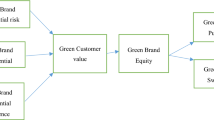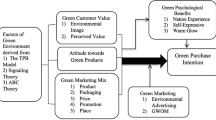Abstract
Green marketing may provide a marketer with a differential advantage. However, a great concern for green marketers is the “ethical consumption attitude-behaviour gap” sometimes simply referred to as the “green gap” or green “attitude-behaviour gap” – reflecting the reality that while consumers may care about the environment, they would not necessarily engage in green consumption behaviours. A plausible approach to closing the green “attitude-behaviour” gap may involve relying on customers’ willingness to act as “partial marketing employees” and voluntarily assist other consumers by advocating product benefits and persuading others to make a green purchase. Customers could also provide feedback to the firm to improve its product, which may lead to further green purchasing behaviour. Subsequently, the successful investment in customers as “partial marketing employees” would require additional information on: (1) who the potential candidates are, (2) how likely they are to seek the job, (3) the candidates’ behavioural characteristics and (4) where firm investment may be needed to enhance performance. The present study aimed to provide insight into these matters. A total of 1243 self-administered questionnaires were completed by a subset of consumers in the United States. Latent class analysis and structural equation modelling assisted in finding the required information to effectively invest in customers as “partial marketing employees”. Ultimately, the findings serve to further enlighten scholars on the role and value of green marketing practices that can also be performed by fellow customers, which may offer a more cost-effective and practical solution for closing the green “attitude-behaviour” gap and obtaining a competitive advantage. The results further indicate that there is a large workforce of “partial marketing employees” who may assist marketers in facilitating greater green product adoption, as both strong and weak supporters are likely to engage in citizenship behaviours, Hence, scholarly research should not only focus on understanding and motivating strong supporters of green behaviour. Although strong supporters are more likely to engage in citizenship behaviours, it may be worth also nurturing weak supporters and improving their employability to perform citizenship behaviours.
Access this chapter
Tax calculation will be finalised at checkout
Purchases are for personal use only
Similar content being viewed by others
Author information
Authors and Affiliations
Corresponding author
Editor information
Editors and Affiliations
Rights and permissions
Copyright information
© 2020 The Academy of Marketing Science
About this paper
Cite this paper
van Tonder, E., Fullerton, S., de Beer, L.T. (2020). Customers as “Partial Marketing Employees”: An Alternative Approach to Closing the Green “Attitude-Behaviour” Gap: An Abstract. In: Pantoja, F., Wu, S., Krey, N. (eds) Enlightened Marketing in Challenging Times. AMSWMC 2019. Developments in Marketing Science: Proceedings of the Academy of Marketing Science. Springer, Cham. https://doi.org/10.1007/978-3-030-42545-6_157
Download citation
DOI: https://doi.org/10.1007/978-3-030-42545-6_157
Published:
Publisher Name: Springer, Cham
Print ISBN: 978-3-030-42544-9
Online ISBN: 978-3-030-42545-6
eBook Packages: Business and ManagementBusiness and Management (R0)




